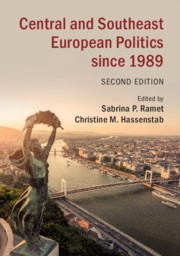Book contents
- Central and Southeast European Politics since 1989
- Central and Southeast European Politics since 1989
- Copyright page
- Dedication
- Contents
- Figures and Maps
- Tables
- Contributors
- Preface
- Glossary
- Guide to the Pronunciation of Central and Southeast European Words
- Additional material
- Part One Introduction
- Part Two Issues
- Part Three Central Europe
- 6 Poland since 1989: Muddling through, Wall to Wall
- 7 Building Democratic Values in the Czech Republic since 1989
- 8 Slovakia since 1989
- 9 Two Faces of Hungary
- Part Four Yugoslav Successor States
- Part Five Southeastern Europe
- Part Six Present and Future Challenges
- Index
- References
6 - Poland since 1989: Muddling through, Wall to Wall
from Part Three - Central Europe
Published online by Cambridge University Press: 16 September 2019
- Central and Southeast European Politics since 1989
- Central and Southeast European Politics since 1989
- Copyright page
- Dedication
- Contents
- Figures and Maps
- Tables
- Contributors
- Preface
- Glossary
- Guide to the Pronunciation of Central and Southeast European Words
- Additional material
- Part One Introduction
- Part Two Issues
- Part Three Central Europe
- 6 Poland since 1989: Muddling through, Wall to Wall
- 7 Building Democratic Values in the Czech Republic since 1989
- 8 Slovakia since 1989
- 9 Two Faces of Hungary
- Part Four Yugoslav Successor States
- Part Five Southeastern Europe
- Part Six Present and Future Challenges
- Index
- References
Summary
Even though Poland’s post-Communist transformation after 1989 had been remarkably successful, worrying symptoms (low electoral turnouts, authoritarian tendencies in the presidency, the dominant role of the Church, strong nationalist and populist tendencies) indicated that problems remained. Yet spectacular economic growth, uncontested democratic alternation of power, and eventual integration in the European Union seemed to put those concerns at rest. Yet in 2015 the right-populist PiS party unequivocally won the presidential and then parliamentary elections, turning the country dramatically around. The value, indeed the legitimacy, of the previous quarter-century of state functioning was challenged, rule of law undermined, pluralism of expression targeted, and opposition assailed as treasonous. This explosion of populist resentment had been fueled by unfulfilled expectations of the country rapidly achieving West European living standards, and by the increasingly unequal development of different regions and sectors. It also expressed hitherto muted rage at a liberal political correctness which did away with the privileged position of the ethnic community and of the Catholic Church, and was unwilling to engage in a purge of those responsible for past communist oppression. Though also expressing a general Europe-wide discontent with the liberal order, the Polish political confrontation showed a country bitterly at odds with itself.
- Type
- Chapter
- Information
- Central and Southeast European Politics since 1989 , pp. 135 - 164Publisher: Cambridge University PressPrint publication year: 2019

